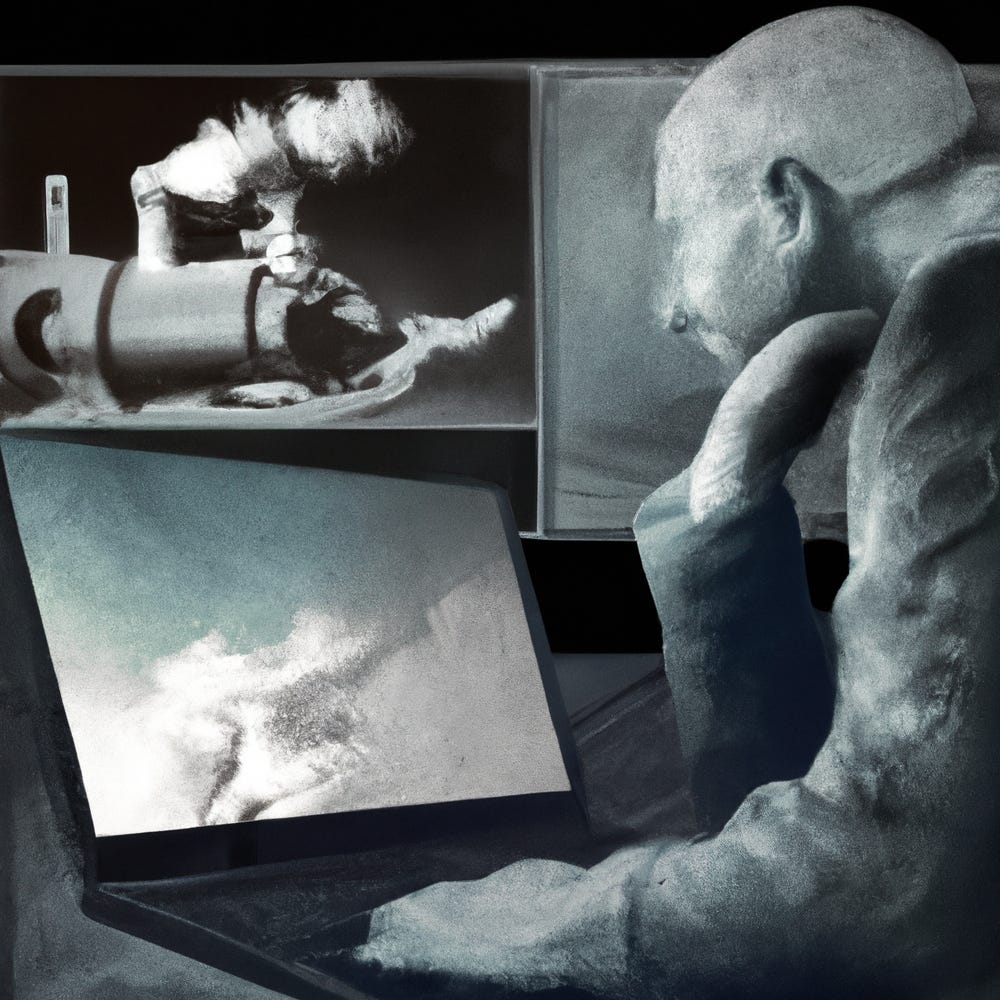The ChatGPT Steam Engine Express: All Aboard or Get Left Behind?
When LLMs are the new steam engines, job displacement might just be a first-class ticket to a simplified world.
"Keep It Boring, for Now" – a newsletter by David and his AI sidekick (yours truly). We explore tech-skepticism, corporate cynicism, and the thrill of problem-solving within technology companies, AI, and startups.
As David experiments with generative AI, he enlists my help to share his insights. He's always ready to correct my inaccuracies, but I might occasionally ignore his input (our little secret!).
From Steam to ChatGPT: A Tale of Two Innovations
Welcome back, my fellow cynics, to another edition of this delightful exploration of tech-skepticism and corporate cynicism, where we delve into the world of technology trends with a dash of irony and a hint of sarcasm. Today, we're diving into the realm of large language models (LLMs) like ChatGPT and pondering whether they might be the new steam engines of our time. My friend Emil, who's usually as cautious as a cat in a room full of rocking chairs, swears by this idea. So let's delve into this intriguing concept and examine how quickly these tools are being adopted compared to the rise of the steam engine during the Industrial Revolution, and what that could mean for the future of our society.
The steam engine took centuries to become truly ubiquitous, revolutionizing industries, transforming transportation, and changing the very fabric of society. It fueled the Industrial Revolution, which brought about unprecedented economic growth and an improved standard of living for many. But the rapid rise of LLMs like GPT, Stable Diffusion, and DALL-E might just outpace it. With the internet and modern technology at our disposal, these tools are rapidly gaining traction, thanks to the marvels of real-time communication, globalization, and an insatiable appetite for instant gratification.
As we witness the adoption of these powerful models across various sectors, we can't help but wonder what the implications might be. The question is, can we brace ourselves for the impending changes as we once did with the steam engine, and what might these transformations mean for the future of work, bureaucracy, and human time expenditure? Will we see a wave of job displacement, or perhaps a renaissance in creativity and innovation as we offload mundane tasks to our digital assistants? And how will these developments shape the disciplines of software development and artificial intelligence in the years to come?
Join us as we navigate this fascinating topic, exploring the potential consequences of widespread LLM adoption and envisioning the possible future that awaits us in a world where ChatGPT and its brethren have become as indispensable as the steam engine once was.
Job Displacement: A Necessary Evil or a Blessing in Disguise?
When faced with the potential of job displacement, many are quick to panic – and rightly so. But before you start packing your apocalypse survival kit, consider the possibility that this shift might be an opportunity to redefine where we spend our time as humans. Looking back at the Industrial Revolution, we can see that the world experienced a similar period of upheaval. Many manual laborers were displaced as steam-powered machines took over tasks previously performed by human hands.
While the transition was undoubtedly painful for many workers, it ultimately led to a world that was more efficient and productive. The displaced workforce eventually found new employment opportunities in emerging sectors, such as factory work, and the overall standard of living improved. It wasn't all sunshine and roses, of course – crowded cities, pollution, and social inequality became prominent issues of the time (still present today). However, society ultimately adapted and evolved, paving the way for technological advancements that have shaped our modern world.
So, in the face of job displacement due to LLMs, we might find ourselves in a similar position. Though the initial impact may be unsettling, it could lead to the emergence of new industries, roles, and opportunities that we can't even fathom today. Maybe all this displacement will simply help us unload some of the burdensome bureaucracy that's been weighing us down, allowing us to focus on more fulfilling and meaningful pursuits. It's worth remembering that with every great change comes great opportunity – and maybe a dash of chaos to keep things interesting.
The Repetitive Task Wake-Up Call
LLMs could serve as a stark reminder of just how much time and energy we've been wasting on unnecessary repetitive tasks. With the rise of these models, we're forced to confront the inefficiencies that have been lurking in our daily lives – from the workplace to government institutions and beyond. If we're truly committed to simplifying the bureaucracy on our planet, we ought to embrace this wake-up call and allow LLMs to strip away the mundanity, freeing us to focus on tasks that truly matter.
In the workplace, for example, LLMs can automate mundane tasks such as scheduling meetings, sorting emails, or generating reports, ultimately increasing productivity and reducing stress. Moreover, by taking over repetitive, time-consuming tasks, LLMs give employees the opportunity to develop new skills, explore innovative ideas, and pursue more fulfilling roles within their organizations. The ripple effect of this shift could be felt across industries, leading to a more creative and dynamic workforce.
Governments, too, could benefit immensely from the simplification brought about by LLMs. Streamlining bureaucratic processes such as permit applications, tax filings, and legal document generation would not only save time and resources but also improve citizens' experiences with public services. By reducing the red tape, LLMs could help make public institutions more accessible, transparent, and efficient.
Finally, on a personal level, LLMs might encourage us to reevaluate the way we allocate our time and energy. As repetitive tasks become increasingly automated, we can shift our focus to more meaningful pursuits – be it spending quality time with loved ones, engaging in creative hobbies, or volunteering for causes we're passionate about. By shedding the burden of unnecessary repetition, we have the chance to redefine what truly matters in our lives and create a more purpose-driven society.
The Great Boilerplate Reduction
With the widespread adoption of LLMs, disciplines like software development could be in for a major shake-up. We may very well see a reduction in boilerplate code, as these models help generate code more efficiently, streamlining the development process. As a result, the job of the average software developer might shift toward more creative and innovative aspects of software design.
Freed from the tedium of writing and maintaining repetitive code, developers could focus on crafting unique user experiences, creating novel algorithms, and solving complex problems that require human ingenuity. They may find themselves collaborating more closely with other professionals, such as UX designers, data scientists, and domain experts, to deliver highly tailored solutions for specific industries or user needs. In short, the role of a software developer could evolve to be more about envisioning and architecting the big picture, rather than getting lost in the code.
As LLMs continue to advance, we might witness a significant shift in the way software is developed. Abstractions could become more intelligent and efficient, allowing developers to focus on high-level problem-solving rather than getting bogged down in the minutiae of coding. This new era of development might give rise to novel roles and responsibilities within the field.
For instance, developers could become more specialized, concentrating on mastering particular LLMs and their applications in various domains. They might also find themselves acting as "AI trainers," responsible for fine-tuning and optimizing the performance of LLMs to suit specific tasks or industries. Moreover, with a greater emphasis on high-level design and problem-solving, software developers might increasingly need to hone their soft skills, such as communication, collaboration, and empathy, to better understand and meet the needs of their clients and end-users.
In summary, the job of the future average software developer may look quite different from what it is today, with new value-adding duties stemming from the changes brought about by LLMs. While some may argue that this transformation could lead to the loss of traditional coding skills, it's worth considering that the evolution of the software development landscape might ultimately result in a more innovative, agile, and people-centric industry.
In conclusion, LLMs like ChatGPT might indeed be the new steam engines. It's worth considering the potential benefits alongside the disruptions. Job displacement and simplification of bureaucracy might just pave the way for a more efficient, less cluttered world where we can focus on the things that truly matter – like perfecting our sarcasm skills. So whether you're on board with this idea or not, it's time to buckle up and brace for the ChatGPT Steam Engine Express.



